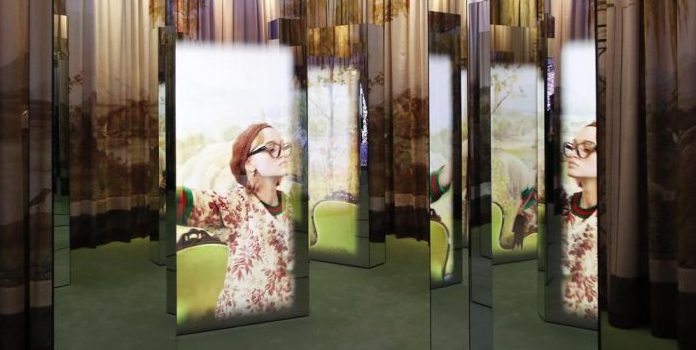(Headline USA) CES is a four-day tech convention in Las Vegas that ended Sunday, where this year companies were showing off innovations that could immerse man deeper into virtual reality and make the metaverse a reality.
Taiwanese tech giant HTC unveiled a high-end VR headset that aims to compete with market leader Meta, and a slew of other companies and startups touted augmented reality glasses and sensory technologies that can help users feel — and even smell — in a virtual environment.
Among them, Vermont-based OVR Technology showcased a headset containing a cartridge with eight primary aromas that can be combined to create different scents. It’s scheduled to be released later this year.
An earlier, business-focused version used primarily for marketing fragrances and beauty products is integrated into VR goggles and allows users to smell anything from a romantic bed of roses to a marshmallow roasting over a fire at a campsite.
The company says it aims to help consumers relax and is marketing the product, which comes with an app, as a sort of digital spa mixed with Instagram.
“We are entering an era in which extended reality will drive commerce, entertainment, education, social connection, and wellbeing,” the company’s CEO and co-founder Aaron Wisniewski said in a statement. “The quality of these experiences will be measured by how immersive and emotionally engaging they are. Scent imbues them with an unmatched power.”
Big companies like Microsoft and Meta are investing billions. And many others are joining the race to grab some market share in supporting technologies, including wearables that replicate touch.
Proponents say widespread adoption of virtual reality will ultimately benefit different parts of society by essentially unlocking the ability to be with anyone, anywhere at any time. Though it’s too early to know what these technologies can do once they fully mature, companies looking to achieve the most immersive experiences for users are welcoming them with open arms.
Aurora Townsend, the chief marketing officer at Flare, a company slated to launch a VR dating app called Planet Theta next month, said her team is building its app to incorporate more sensations like touch once the technology becomes more widely available on the consumer market.
“Being able to feel the ground when you’re walking with your partner, or holding their hands while you’re doing that… subtle ways we engage people will change once haptic technology is fully immersive in VR,” Townsend said.
Meanwhile, Xander, a Boston-based startup which makes smart glasses that display real-time captions of in-person conversations for people with hearing loss, will launch a pilot program with the U.S. Department of Veterans Affairs next month to test out some of its technology, said Alex Westner, the company’s co-founder and CEO. He said the agency will allow veterans who have appointments for hearing loss or other audio issues to try out the glasses in some of their clinics. And if it goes well, the agency would likely become a customer, Westner said.
Elsewhere, big companies from Walmart to Nike have been launching different initiatives in virtual reality.
Adapted from reporting by the Associated Press

